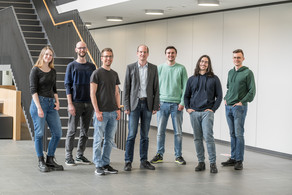NeurIPS 2022 Deep RL workshop: Three papers accepted!
Cyclophobic Reinforcement Learning
Authors: Stefan Sylvius Wagner Martinez, Peter Arndt, Jan Robine, Stefan Harmeling
Abstract: In environments with sparse rewards finding a good inductive bias for exploration is crucial to the agent’s success. However, there are two competing goals: novelty search and systematic exploration. While existing approaches such as curiousity- driven exploration find novelty, they sometimes do not systematically explore the whole state space, akin to depth-first-search vs breadth-first-search. In this paper, we propose a new intrinsic reward that is cyclophobic, i.e. it does not reward novelty, but punishes redundancy by avoiding cycles. Augmenting the cyclophobic intrinsic reward with a sequence of hierarchical representations based on the agent’s cropped observations we are able to achieve excellent results in the MiniGrid and MiniHack environments. Both are particularly hard, as they require complex interactions with different objects in order to be solved. Detailed comparisons with previous approaches and thorough ablation studies show that our newly proposed cyclophobic reinforcement learning is vastly more efficient than other state of the art methods.
Time-Myopic Go-Explore: Learning A State Representation for the Go-Explore Paradigm
Authors: Marc Hörftmann, Jan Robine, Stefan Harmeling
Abstract: Very large state spaces with a sparse reward signal are difficult to explore. The lack of a sophisticated guidance results in a poor performance for numerous reinforcement learning algorithms. In these cases, the commonly used random exploration is often not helpful. The literature shows that this kind of environments require enormous efforts to systematically explore large chunks of the state space. Learned state representations can help here to improve the search by providing semantic context and build a structure on top of the raw observations. In this work we introduce a novel time-myopic state representation that clusters temporal close states together while providing a time prediction capability between them. By adapting this model to the Go-Explore paradigm (Ecoffet et al., 2021b), we demonstrate the first learned state representation that reliably estimates novelty instead of using the hand-crafted representation heuristic. Our method shows an improved solution for the detachment problem which still remains an issue at the Go-Explore Exploration Phase. We provide evidence that our proposed method covers the entire state space with respect to all possible time trajectories — without causing disadvantageous conflict-overlaps in the cell archive. Analogous to native Go-Explore, our approach is evaluated on the hard exploration environments MontezumaRevenge, Gravitar and Frostbite (Atari) in order to validate its capabilities on difficult tasks. Our experiments show that time-myopic Go-Explore is an effective alternative for the domain-engineered heuristic while also being more general. The source code of the method is available on GitHub.
Transformer-based World Models Are Happy With 100k Interactions
Authors: Jan Robine, Marc Höftmann, Tobias Uelwer, Stefan Harmeling
Abstract: Deep neural networks have been successful in many reinforcement learning settings. However, compared to human learners they are overly data hungry. To build a sample-efficient world model, we apply a transformer to real-world episodes in an autoregressive manner: not only the compact latent states and the taken actions but also the experienced or predicted rewards are fed into the transformer, so that it can attend flexibly to all three modalities at different time steps. The transformer allows our world model to access previous states directly, instead of viewing them through a compressed recurrent state. By utilizing the Transformer-XL architecture, it is able to learn long-term dependencies while staying computationally efficient. Our transformer-based world model (TWM) generates meaningful, new experience, which is used to train a policy that outperforms previous model-free and model-based reinforcement learning algorithms on the Atari 100k benchmark.



